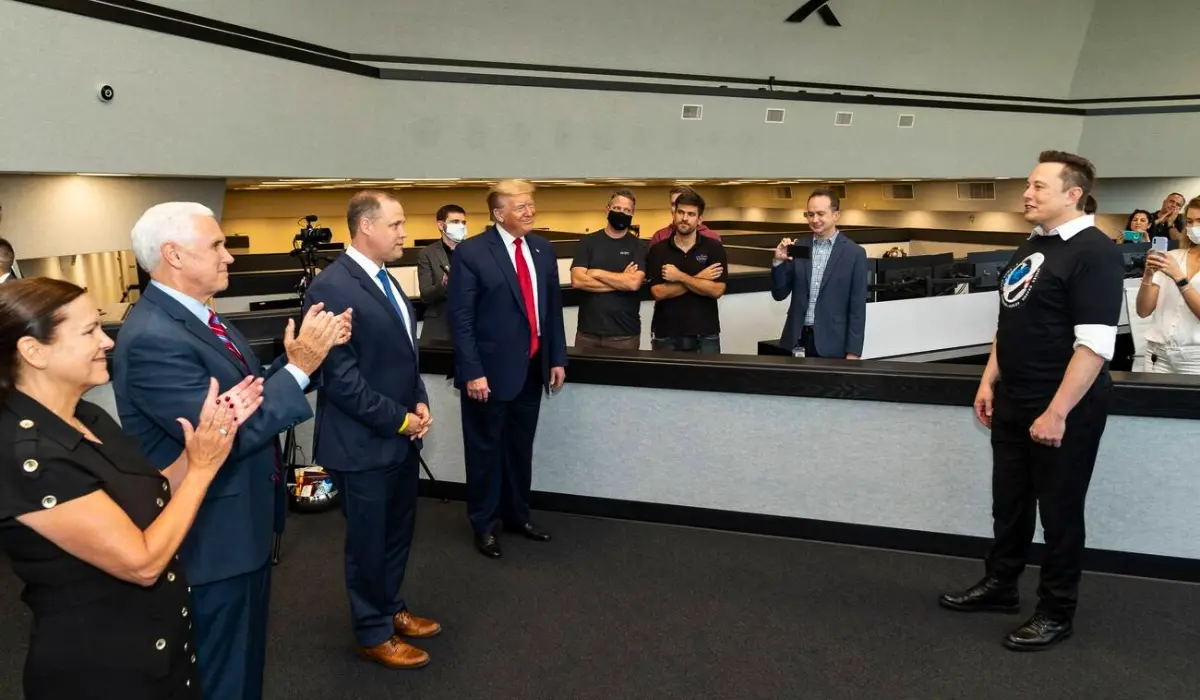In a bold move that has sparked widespread debate, Tesla CEO Elon Musk has once again thrown his support behind former President Donald Trump in the upcoming U.S. elections. Musk, who has been relatively neutral in politics in the past, is now making a passionate case for Trump’s victory, claiming that the future of civilization depends on it.
His endorsement of Trump marks a significant shift in his political stance and has fueled conversations about the role of tech moguls in influencing political discourse.
Musk’s Surprising Endorsement Of Trump
Elon Musk, one of the most influential figures in the tech world, has openly stated that Donald Trump must win the U.S. presidential elections to protect what he sees as the core values of freedom and meritocracy in America. Musk made these comments in response to a post on the social media platform X, where he was praised for his ability to synthesize complex information.

Seizing the opportunity to share his political views, Musk highlighted the stakes of the upcoming election: “I have never been materially active in politics before, but this time I think civilization as we know it is on the line. If we want to preserve freedom and meritocracy in America, then Trump must win.”
This marks a significant shift for Musk, who had previously shown support for Democrats. In the 2020 election, Musk had endorsed Joe Biden, and before that, he had voted for Hillary Clinton in 2016. His decision to back Trump now, however, appears to be driven by his belief that the U.S. is at a critical crossroads, where the values he holds dear could be at risk.
Freedom And Meritocracy: Musk’s Vision For America
Musk’s central argument for supporting Trump revolves around the idea that the United States must remain a bastion of freedom and meritocracy. He suggests that Trump, with his focus on deregulation and pro-business policies, offers the best chance to uphold these principles. “This is about preserving the idea that people should be rewarded for their skills and efforts, not for political allegiance or identity,” Musk stated.
His comments align with Trump’s often-repeated narrative of restoring American greatness, with a focus on reducing government intervention and emphasizing individual achievement. Musk, a self-made billionaire who has revolutionized industries such as electric vehicles, space exploration, and clean energy, likely sees Trump’s approach as compatible with his own beliefs in innovation, entrepreneurship, and personal responsibility.
Musk’s endorsement isn’t just a passing comment; he has been actively involved in promoting Trump’s candidacy. He has suggested a potential role in Trump’s cabinet should the former president be re-elected and even conducted an exclusive interview with Trump on X, the platform formerly known as Twitter, which Musk now owns. This interview marks a significant moment, as it comes years after Trump was banned from the platform for inciting violence following the January 6 Capitol riot.
A Shift From Musk’s Previous Political Stance
Elon Musk’s shift from supporting Democratic candidates to endorsing Donald Trump has raised eyebrows. In the 2020 election, Musk voted for Joe Biden and worked closely with the Obama administration on several initiatives, particularly around clean energy and electric vehicles. His backing of Hillary Clinton in 2016 further reinforced his alignment with the Democratic Party.
However, Musk’s relationship with the current administration has soured, especially in recent years. He has been critical of Biden’s handling of the economy, government spending, and what he perceives as overregulation, particularly in industries like clean energy, which Musk is heavily invested in. Additionally, Musk has voiced concerns about the growing influence of “woke” politics, a term used to describe progressive policies that emphasize social justice. He has repeatedly spoken out against what he sees as a stifling of free speech and merit-based opportunities in favor of identity politics.
His public criticism of Vice President Kamala Harris also illustrates this growing divide. Recently, Musk shared an AI-generated image of Harris, criticizing her stance by sarcastically stating that she “vows to be a communist dictator on day one.” The post came in response to Harris’s own critique of Trump, where she accused him of wanting to become a dictator if he regains the presidency. Musk’s sharp rebuke of Harris indicates his growing alignment with Trump’s more conservative approach to governance.
Musk’s Influence On Political Discourse
As one of the most prominent figures in both the tech and business world, Musk’s public endorsements carry weight. His vast following on X, where he has millions of engaged followers, makes him an influential figure in shaping public opinion. By voicing his support for Trump, Musk is positioning himself not just as a businessman but as a key player in the broader political landscape.
Musk’s influence, however, comes with its challenges. His endorsement of Trump has sparked criticism from various corners, with some accusing him of joining the “MAGA cult” and spreading misinformation. Musk, however, seems undeterred by these accusations, doubling down on his belief that Trump’s leadership is essential for America’s future.
Conclusion: A Critical Moment In U.S. Politics
Elon Musk’s endorsement of Donald Trump marks a significant moment in the run-up to the U.S. presidential elections. For Musk, this is not just a political choice but a battle for the future of civilization as he sees it. His focus on preserving freedom, meritocracy, and innovation aligns with Trump’s platform, making the Tesla CEO a vocal advocate for the former president’s return to the White House.
As the election draws nearer, Musk’s influence could play a crucial role in shaping the opinions of millions of voters, particularly those who admire his entrepreneurial spirit and forward-thinking approach to technology and business. Whether or not Trump’s candidacy will prevail, Musk’s involvement ensures that the 2024 election will be a pivotal moment not just in American politics but in the intersection of tech, business, and governance.

